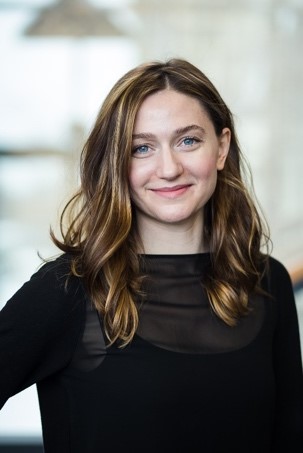 Katherine Benjamin (BHK 2008) is an internationally recognized leader in the digital service design community. Katherine’s work delivering service design projects in complex organizations has spanned a range of industries. Among them she has served as Vice President of Ayogo, a Vancouver-based digital healthcare startup company, and currently serves as Deputy Chief Technology Officer for Digital Services at NYC Mayor’s Office.
Katherine Benjamin (BHK 2008) is an internationally recognized leader in the digital service design community. Katherine’s work delivering service design projects in complex organizations has spanned a range of industries. Among them she has served as Vice President of Ayogo, a Vancouver-based digital healthcare startup company, and currently serves as Deputy Chief Technology Officer for Digital Services at NYC Mayor’s Office.
When asked about her memories as a KIN student she reflects, “my world went from black and white to technicolor when I took HKin classes that brought in sociology, psychology, and critical theory. I discovered whole academic areas richly describing some of the observations I’d had about the politics and power of sport. That there were people documenting, naming, and challenging sport as it relates to race, gender, class, power, and other intersectional considerations was the point at which I found my niche.”
While she was at UBC, Katherine was an athlete and coach for the UBC Varsity Ski team and was an Academic All-Canadian, and three-time All-American with the United States Collegiate Ski and Snowboard Association. During this time, she volunteered for the Beauty Night Society, and later developed a free fitness service for them called Womyn’s Gym, which was led by student volunteers. Katherine states that “through this work, I learned that although people came to Womyn’s Gym for the fitness classes, it was not the inherent appeal of exercise that drew people to the service. Rather, our provision of things like free childcare, fashionable leisurewear, and social time that enabled team-building and feelings of inclusion; the fitness bit…appeared to be somewhat secondary to the community building aspects.”
It was this aspect of community building that led Katherine to do her Master of Science in Health, Community and Development at the London School of Economics and Political Science (2010). “My academic focus pivoted to understanding how the broader social determinants of health impact an individual’s ability to have agency. For example, it is not very helpful to encourage people to walk 10,000 steps a day if they are not safe walking in their community; given these parameters, how might you design a walking program to support people who feel unsafe? Later, I added an additional lens to my work, digital technology. This was a natural transition that coincided with the mass adoption of smartphones.”
Over the last 10 years, Katherine has worked on innovation-focused projects in Canada, Malawi, the UK, and the United States for organizations like lululemon, the City of New York, the UK’s National Health Service, and the Ontario Cabinet Office. In 2017, she began teaching Service Design at Emily Carr University of Art + Design, where she often focuses on health design projects.
Katherine states that she leveraged UBC Kin skills and knowledge to grow her career from the research methods she acquired saying, “given my focus on qualitative methods of inquiry, expertise in research ethics is incredibly helpful. My ability to understand and use ethics review boards means that I have been able to conduct novel research with human subjects safely and respectfully.”
Katherine’s tips for students: “Take the time to learn things properly and with a bit of practice, it becomes much less daunting as you learn to flag and mitigate risk in the research process and develop your inner ethics compass.” And “consider taking electives that are out of your comfort zone — it will change your world view. For young alumni, adopt a learning mindset so you can approach the world with curiosity, humility, and empathy.”
